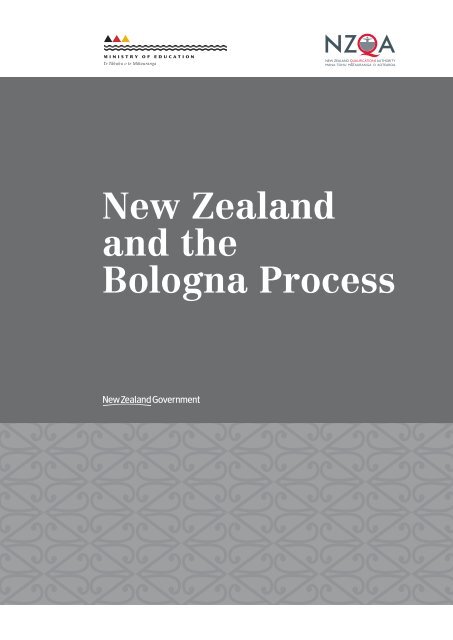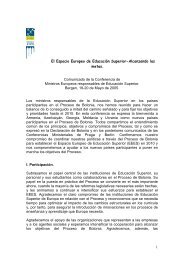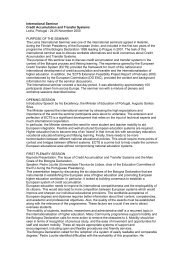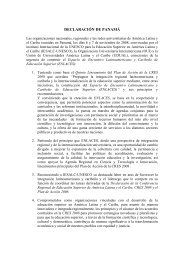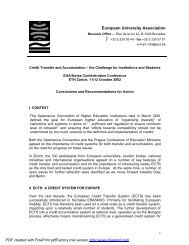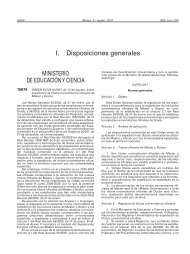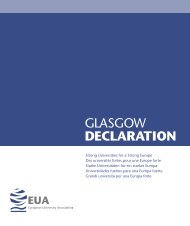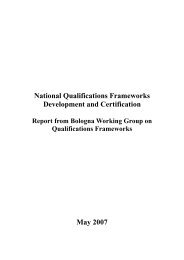New Zealand and the Bologna Process
New Zealand and the Bologna Process
New Zealand and the Bologna Process
You also want an ePaper? Increase the reach of your titles
YUMPU automatically turns print PDFs into web optimized ePapers that Google loves.
3ForewordSince its inception in 1999, <strong>the</strong> <strong>Bologna</strong> <strong>Process</strong> has had a significantimpact on European higher education. As <strong>the</strong> implications of <strong>Bologna</strong>spread globally, it is important for <strong>New</strong> <strong>Zeal<strong>and</strong></strong> to engage with <strong>the</strong>se highereducation reforms.<strong>Bologna</strong> provides <strong>New</strong> <strong>Zeal<strong>and</strong></strong> with an opportunity. We can use <strong>the</strong><strong>Bologna</strong> framework to enhance our international connections <strong>and</strong> ensureour graduates can access study <strong>and</strong> labour opportunities around <strong>the</strong> world.Using <strong>Bologna</strong>’s tools <strong>and</strong> practices, we can improve <strong>the</strong> recognition of<strong>New</strong> <strong>Zeal<strong>and</strong></strong> qualifications <strong>and</strong> <strong>the</strong> development of our quality assuranceprocesses.<strong>New</strong> <strong>Zeal<strong>and</strong></strong>’s tertiary education system is already comparable to <strong>the</strong><strong>Bologna</strong> ideal. Our three-level degree structure, Register of Quality AssuredQualifications, quality assurance st<strong>and</strong>ards, efforts at increasingparticipation in tertiary education, <strong>and</strong> policies that promote institutionalautonomy, all closely align with <strong>the</strong> key elements of <strong>the</strong> <strong>Bologna</strong> <strong>Process</strong>.Fur<strong>the</strong>r work has been undertaken across <strong>the</strong> tertiary education system tobuild on this high level of comparability. <strong>New</strong> <strong>Zeal<strong>and</strong></strong> has acceded to <strong>the</strong>Lisbon Qualification Recognition Convention, is investigating <strong>the</strong>introduction of a Diploma Supplement, <strong>and</strong> is verifying <strong>the</strong> comparability of<strong>the</strong> Register of Quality Assured Qualifications with Irel<strong>and</strong>’s NationalFramework of Qualifications.At <strong>the</strong> same time as enhancing our engagement with <strong>Bologna</strong>, we havealso focused on ensuring our tertiary education system relates to o<strong>the</strong>reducation systems around <strong>the</strong> world <strong>and</strong> maintains its own individualcharacteristics. The strength of <strong>New</strong> <strong>Zeal<strong>and</strong></strong>’s tertiary education system isits commitment to national goals <strong>and</strong> to <strong>the</strong> communities it serves.Karen SewellSecretary for EducationMinistry of EducationDr Karen PoutasiChief Executive<strong>New</strong> <strong>Zeal<strong>and</strong></strong> Qualifications Authority
5Background on <strong>the</strong><strong>Bologna</strong> <strong>Process</strong>The <strong>Bologna</strong> Declaration, agreed by 31 European Higher EducationMinisters from 29 countries on 19 June 1999, set in train <strong>the</strong> <strong>Bologna</strong><strong>Process</strong>. Participating European countries sought to create an integratedEuropean Higher Education Area (EHEA) by 2010, characterised byenhanced student, academic <strong>and</strong> labour mobility <strong>and</strong> greater ease ofcomparability of higher education systems.In spite of its voluntary nature <strong>and</strong> individual country implementation, <strong>the</strong><strong>Bologna</strong> <strong>Process</strong> has brought about more change in higher education inEurope than any o<strong>the</strong>r international instrument or policy. The <strong>Bologna</strong><strong>Process</strong> now involves 46 European countries <strong>and</strong> is increasingly likely tohave global implications in <strong>the</strong> field of higher education.The <strong>Bologna</strong> Declaration signatories are limited to those countries whichhave signed <strong>the</strong> Council of Europe’s European Cultural Convention (1954).The Thinking Behind <strong>the</strong> ReformsThe <strong>Bologna</strong> <strong>Process</strong> was initiated in an attempt to address perceivedweaknesses in <strong>and</strong> between European higher education systems. It soughtto improve student completion rates, <strong>the</strong> speed with which graduates couldenter <strong>the</strong> labour market, <strong>and</strong> academic <strong>and</strong> labour market mobility betweenEuropean countries. As <strong>the</strong> <strong>Process</strong> has developed, greater priority hasbeen given to student mobility, <strong>and</strong> most recently to <strong>the</strong> development ofglobal relationships.Towards <strong>the</strong> European Higher Education AreaThe <strong>Bologna</strong> <strong>Process</strong> seeks to create <strong>the</strong> EHEA by 2010. The EHEA is notintended as a unitary European system of higher education. Ra<strong>the</strong>r, it isa ‘space’ in which national systems possess common key features, in whichqualifications offered by institutions in <strong>the</strong> EHEA are easily recognised<strong>and</strong> assessed by institutions <strong>and</strong> employers for purposes of fur<strong>the</strong>r study oremployment, <strong>and</strong> in which <strong>the</strong>re is a high level of mobility by students<strong>and</strong> staff.Progress towards <strong>the</strong> creation of <strong>the</strong> EHEA is encouraged by biennialministerial meetings <strong>and</strong> officials groups.<strong>Bologna</strong> ProgressThe <strong>Bologna</strong> <strong>Process</strong> is progressed by biennial ministerial meetingsat which an official statement is agreed outlining priorities for <strong>the</strong>coming years.Sorbonne DeclarationThe precursor to <strong>the</strong> <strong>Bologna</strong> Declaration, <strong>the</strong> Sorbonne Declaration wasagreed by Higher Education Ministers from France, Germany, Italy <strong>and</strong> <strong>the</strong>United Kingdom on 25 May 1998. The Sorbonne Declaration laid <strong>the</strong>foundation for <strong>the</strong> <strong>Bologna</strong> <strong>Process</strong> by seeking <strong>the</strong> improvement of externalrecognition of national higher education systems to facilitate studentmobility <strong>and</strong> employability.
6 <strong>Bologna</strong> DeclarationSigned by 31 Ministers of Higher Education from 29 countries, <strong>the</strong> 1999<strong>Bologna</strong> Declaration committed signatories to six objectives, which toge<strong>the</strong>raim to establish <strong>the</strong> EHEA by 2010. These objectives are:• The adoption of a system of easily readable <strong>and</strong> comparable degrees• The adoption of a system essentially based on two main cycles• The establishment of a system of credits as a propermeans of promoting student mobility• The promotion of mobility• The promotion of European cooperation in quality assurance, <strong>and</strong>• The promotion of <strong>the</strong> necessary Europe<strong>and</strong>imensions in higher education.Prague CommuniquéIn 2001, Ministers reaffirmed <strong>the</strong>ir commitment to establish <strong>the</strong> EHEA by2010 <strong>and</strong> added a focus on lifelong learning, <strong>and</strong> promotion of <strong>the</strong>attractiveness of <strong>the</strong> EHEA to <strong>the</strong>ir work programme. They also exp<strong>and</strong>ed<strong>the</strong> <strong>Process</strong> to engage higher education institutions <strong>and</strong> students.Berlin CommuniquéAt <strong>the</strong> 2003 meeting, Ministers sought to speed up <strong>the</strong> realisation of <strong>the</strong>EHEA, <strong>and</strong> added a third cycle to <strong>the</strong> system to include doctorates.Bergen CommuniquéIn 2005, membership was extended from 40 countries to 45. Ministersadopted an overarching framework for qualifications in <strong>the</strong> EHEA <strong>and</strong>committed to begin adapting national frameworks for qualifications by2007 <strong>and</strong> completing <strong>the</strong> process by 2010.London CommuniquéThe 2007 London meeting saw Ministers commit to completing <strong>the</strong> existingAction Lines. They accepted plans for establishment of a European Registerof Quality Assurance Agencies <strong>and</strong> for <strong>the</strong> <strong>Bologna</strong> international strategy.Benelux MeetingThe next meeting of <strong>Bologna</strong> Ministers is to be hosted by <strong>the</strong> Beneluxcountries in April 2009.Implementation by SubsidiarityImplementation of <strong>the</strong> <strong>Bologna</strong> <strong>Process</strong> occurs through <strong>the</strong> model ofsubsidiarity – or individual country / state implementation. As a result,considerable variance in implementation exists between – <strong>and</strong> within –countries. The common language of <strong>Bologna</strong> <strong>and</strong> its tools have, however,improved transparency between systems.A number of reporting mechanisms have been developed to measureprogress across countries. For each biennial Ministers meeting:• <strong>the</strong> <strong>Bologna</strong> Follow-Up Group (BFUG) of senior officialsprepares a report on progress against specific initiativesrequested in <strong>the</strong> previous Communiqué• officials prepare a Stocktaking Report, based on country selfreporting<strong>and</strong> focused on legislative <strong>and</strong> regulatory progress• <strong>the</strong> European University Association (EUA) reportson progress at institutional level, through analysis ofsurvey responses, <strong>and</strong> a number of site visits• <strong>the</strong> European Students’ Union (ESU), provides a studentperspective in <strong>the</strong>ir ‘<strong>Bologna</strong> with Student Eyes’ report.
7 Despite <strong>the</strong> considerable progress made to date, all parties agree thatongoing work will be necessary beyond 2010 to realise <strong>the</strong> goal of anintegrated EHEA.<strong>Bologna</strong> SignatoriesMembership of <strong>the</strong> <strong>Bologna</strong> <strong>Process</strong> is limited to countries which aresignatories to <strong>the</strong> European Cultural Convention of <strong>the</strong> Council of Europe.Following <strong>the</strong> 2007 ministerial meeting in London, forty-six Europeancountries were signatories to <strong>the</strong> <strong>Bologna</strong> <strong>Process</strong>:Albania Estonia Latvia Russian FederationAndorra Finl<strong>and</strong> Liechtenstein SerbiaArmenia“<strong>the</strong> former YugoslavRepublic of Macedonia”LithuaniaSlovak RepublicAustria France Luxembourg SloveniaAzerbaijan Georgia Malta SpainBelgium Germany Moldova SwedenBosnia-Herzegovina Greece Montenegro Switzerl<strong>and</strong>Bulgaria Holy See Ne<strong>the</strong>rl<strong>and</strong>s TurkeyCroatia Hungary Norway UkraineCyprus Icel<strong>and</strong> Pol<strong>and</strong> United KingdomCzech Republic Irel<strong>and</strong> PortugalDenmark Italy RomaniaParticipating OrganisationsIn addition <strong>the</strong> following organisations participate in <strong>the</strong> <strong>Bologna</strong> <strong>Process</strong>:European CommissionCouncil of EuropeUNESCO European Centre for Higher EducationEuropean University AssociationEuropean Association of Institutions in Higher EducationEuropean Students’ UnionEuropean Association for Quality Assurance in Higher EducationEducation International Pan-European StructureBusiness EuropeThe <strong>Bologna</strong> <strong>Process</strong> is not a European Union programme – membershipis much wider than <strong>the</strong> EU <strong>and</strong> <strong>the</strong> EU has very limited ‘competence’(or constitutional power) over education matters. However, <strong>the</strong> EU is aprincipal stakeholder in <strong>the</strong> <strong>Bologna</strong> <strong>Process</strong> <strong>and</strong> provides significantsupport to its development.
9<strong>Bologna</strong> Degree CyclesPurpose<strong>Bologna</strong>’s degree cycles, stipulating three cycles of higher educationdegrees (Bachelors / Masters / Doctorates), were designed to enhance<strong>the</strong> comparability of degrees across Europe.AboutAt <strong>the</strong> heart of <strong>the</strong> <strong>Bologna</strong> <strong>Process</strong> has been <strong>the</strong> agreement to establishinitially two <strong>and</strong> <strong>the</strong>n three cycles of degrees. The original <strong>Bologna</strong>Declaration stated that <strong>the</strong> first cycle should last a minimum of three years.No length is specified for <strong>the</strong> second cycle (Masters) qualification.Many <strong>Bologna</strong> signatory countries needed to make substantial changes to<strong>the</strong>ir systems in response to <strong>the</strong> <strong>Bologna</strong> <strong>Process</strong>. Continental highereducation systems have moved to divide five <strong>and</strong> six year programmes intotwo cycles.Table Two outlines <strong>the</strong> outcomes expected at each <strong>Bologna</strong> degree cycle.These descriptors, toge<strong>the</strong>r with <strong>the</strong> ECTS credit ranges, form <strong>the</strong>overarching framework for qualifications in <strong>the</strong> EHEA which was adoptedin Bergen in 2005. At <strong>the</strong> Bergen conference Ministers committed toensuring that <strong>the</strong>ir national qualification frameworks become compatiblewith <strong>the</strong> EHEA framework.
10T 2Table TWO<strong>Bologna</strong>’s Degree OutcomesOutcomesFirst CycleQualifications that signify completion of <strong>the</strong> first cycle are awarded tostudents who:• have demonstrated knowledge <strong>and</strong> underst<strong>and</strong>ing in a field of study thatbuilds upon <strong>the</strong>ir general secondary education, <strong>and</strong> is typically at a levelthat, whilst supported by advanced textbooks, includes some aspects thatwill be informed by knowledge of <strong>the</strong> forefront of <strong>the</strong>ir field of study;• can apply <strong>the</strong>ir knowledge <strong>and</strong> underst<strong>and</strong>ing in a manner that indicates aprofessional approach to <strong>the</strong>ir work or vocation, <strong>and</strong> have competencestypically demonstrated through devising <strong>and</strong> sustaining arguments <strong>and</strong>solving problems within <strong>the</strong>ir field of study;• have <strong>the</strong> ability to ga<strong>the</strong>r <strong>and</strong> interpret relevant data (usually within <strong>the</strong>irfield of study) to inform judgments that include reflection on relevant social,scientific or ethical issues;• can communicate information, ideas, problems <strong>and</strong> solutions to bothspecialist <strong>and</strong> non-specialist audiences;• have developed those learning skills that are necessary for <strong>the</strong>m tocontinue to undertake fur<strong>the</strong>r study with a high degree of autonomy.Second CycleQualifications that signify completion of <strong>the</strong> second cycle are awarded tostudents who:• have demonstrated knowledge <strong>and</strong> underst<strong>and</strong>ing that is founded upon<strong>and</strong> extends <strong>and</strong>/or enhances that typically associated with <strong>the</strong> first cycle,<strong>and</strong> that provides a basis or opportunity for originality in developing <strong>and</strong>/orapplying ideas, often within a research context;• can apply <strong>the</strong>ir knowledge <strong>and</strong> underst<strong>and</strong>ing, <strong>and</strong> problem solving abilitiesin new or unfamiliar environments within broader (or multidisciplinary)contexts related to <strong>the</strong>ir field of study;• have <strong>the</strong> ability to integrate knowledge <strong>and</strong> h<strong>and</strong>le complexity, <strong>and</strong>formulate judgments with incomplete or limited information, but thatinclude reflecting on social <strong>and</strong> ethical responsibilities linked to <strong>the</strong>application of <strong>the</strong>ir knowledge <strong>and</strong> judgments;• can communicate <strong>the</strong>ir conclusions, <strong>and</strong> <strong>the</strong> knowledge <strong>and</strong> rationaleunderpinning <strong>the</strong>se, to specialist <strong>and</strong> nonspecialist audiences clearly <strong>and</strong>unambiguously;• have <strong>the</strong> learning skills to allow <strong>the</strong>m to continue to study in a manner thatmay be largely self-directed or autonomous.Third CycleQualifications that signify completion of <strong>the</strong> third cycle are awarded tostudents who:• have demonstrated a systematic underst<strong>and</strong>ing of a field of study <strong>and</strong>mastery of <strong>the</strong> skills <strong>and</strong> methods of research associated with that field;• have demonstrated <strong>the</strong> ability to conceive, design, implement <strong>and</strong> adapt asubstantial process of research with scholarly integrity;• have made a contribution through original research that extends <strong>the</strong> frontierof knowledge by developing a substantial body of work, some of whichmerits national or international refereed publication;• can communicate with <strong>the</strong>ir peers, <strong>the</strong> larger scholarly community <strong>and</strong> withsociety in general about <strong>the</strong>ir areas of expertise;• can be expected to be able to promote, within academic <strong>and</strong> professionalcontexts, technological, social or cultural advancement in a knowledgebased society.ECTS CreditsTypically include 180- 240ECTS credits120 ECTS credits, with aminimum of 60 credits at <strong>the</strong> levelof <strong>the</strong> 2nd cycleNot specified
11 SignificanceAcross Europe most institutions now offer courses based on a 3+2 model,or, where <strong>the</strong> undergraduate qualification is four years long, a 4+1structure. All but three <strong>Bologna</strong> countries have <strong>the</strong> three-cycle structure inplace. The move towards a common degree framework has captured <strong>the</strong>interest of countries outside Europe. While <strong>the</strong> United States is unlikely tochange its degree structures, o<strong>the</strong>r countries are following <strong>the</strong> adoption of<strong>the</strong>se reforms with interest.IssuesThere is ongoing debate within Europe as to <strong>the</strong> most appropriatedefinition of a degree – whe<strong>the</strong>r it is defined by learning outcomes,ECTS credits or years.There is debate as to whe<strong>the</strong>r Honours degrees <strong>and</strong> one year Mastersdegrees are consistent with <strong>the</strong> <strong>Bologna</strong> cycles.At <strong>the</strong> Prague meeting in 2001, Ministers noted that “programmes leadingto a degree may, <strong>and</strong> indeed should, have different orientations <strong>and</strong> variousprofiles in order to accommodate a diversity of individual, academic <strong>and</strong>labour market needs.”The UK Government “firmly believes that one year Taught Masters <strong>and</strong> fouryear Integrated Masters programmes are compatible with <strong>the</strong> <strong>Bologna</strong>framework” 1 . In its response to <strong>the</strong> 2007 Select Committee Inquiry, <strong>the</strong> UKGovernment advised that <strong>the</strong> “focus on learning outcomes has gainedwidespread acceptance with <strong>the</strong> Bergen Communiqué re-emphasising itsimportance by adopting <strong>the</strong> Framework for Qualifications in <strong>the</strong> EHEA,comprising generic descriptors for each cycle based on learning outcomesthat focus on credit ranges ra<strong>the</strong>r than time periods.” 2A recent Royal Society of Chemistry comparative study of Anglo-Danishchemistry in higher education, however, found that <strong>the</strong>re was insufficientopportunity within <strong>the</strong> UK’s 4 year MSci to achieve fully <strong>the</strong> descriptoroutcomes at Masters level, especially in respect of project work. 3In 2006 Scotl<strong>and</strong> <strong>and</strong> Irel<strong>and</strong> completed <strong>the</strong> process of verifying that <strong>the</strong>irnational higher education frameworks are compatible with that of <strong>the</strong>EHEA (see Table Three). In each of <strong>the</strong>se cases <strong>the</strong> Honours degree wasjudged to be at <strong>the</strong> level of <strong>the</strong> first cycle. In both Scotl<strong>and</strong> <strong>and</strong> Irel<strong>and</strong> <strong>the</strong>Honours degree is required for entry to Masters programmes, which <strong>the</strong>nlast for one year.1UK Department for Education <strong>and</strong> Skills <strong>Bologna</strong> <strong>Process</strong>: Excellence through Engagement (2007).2House of Commons The <strong>Bologna</strong> <strong>Process</strong>: Government Response to <strong>the</strong> Committee’s Fourth Report ofSession 2006 – 2007 (2007).3Evidence from <strong>the</strong> Royal Society of Chemistry to <strong>the</strong> Education <strong>and</strong> Skills Committeewww.rsc.org/images/RSCresponseTHEBOLOGNAPROCESSDec06_tcm18-75476.pdf
12T 3Table THreeEHEA-Scotl<strong>and</strong> Qualifications CompatibilityEHEA qualification cyclesShort cycle qualifications within orlinked to <strong>the</strong> first cycleIntermediate awards within <strong>the</strong>first cycleFirst cycle qualificationsIntermediate awards within <strong>the</strong>second cycleSecond cycle qualificationsThird cycle qualificationsQualifications within <strong>the</strong>framework for qualificationsof higher education institutionsin Scotl<strong>and</strong> 4Diploma of Higher EducationCertificate of Higher EducationGraduate CertificateGraduate DiplomaScottish Bachelors DegreeScottish Bachelors Degree withHonoursPostgraduate DiplomaPostgraduate CertificateMasters DegreeIntegrated Masters DegreeMPhil DegreeDoctoral Degrees includingDoctorates by researchQualifications within <strong>the</strong> IrishNational Framework ofQualifications 5Higher CertificateHigher DiplomaOrdinary Bachelor DegreeHonours Bachelor DegreePostgraduate DiplomaMasters DegreeDoctoral Degree<strong>New</strong> <strong>Zeal<strong>and</strong></strong> Comparability<strong>New</strong> <strong>Zeal<strong>and</strong></strong> degree structures are compatible with <strong>Bologna</strong>. Our Bachelor-Masters-Doctorate qualifications structure equates with <strong>Bologna</strong>’s threecycles. Within <strong>the</strong> <strong>Bologna</strong> <strong>Process</strong> <strong>the</strong>re is no fur<strong>the</strong>r definition of courselength o<strong>the</strong>r than that of a first cycle degree of not less than three years.Fur<strong>the</strong>r ActionThe Ministry of Education will continue to monitor <strong>the</strong> debate among <strong>the</strong><strong>Bologna</strong> signatories regarding Honours degrees, one year Masters degrees<strong>and</strong> Integrated Masters degrees.Tertiary education organisations (TEOs) may wish to examine how <strong>the</strong>irown programme structures relate to <strong>the</strong> <strong>Bologna</strong> outcomes, includingexpectations of access to higher degrees.4http://www.enic-naric.net/documents/QF-Scotl<strong>and</strong>_en.pdf5http://www.enic-naric.net/documents/QF-Irel<strong>and</strong>_en.pdf
14 <strong>New</strong> <strong>Zeal<strong>and</strong></strong> ComparabilityWhile o<strong>the</strong>r countries in Europe have varying definitions <strong>and</strong> minimumstudent learning hours for an academic year, <strong>the</strong>re is no requirement in <strong>the</strong><strong>Bologna</strong> <strong>Process</strong> for any minimum student learning hours. <strong>New</strong> <strong>Zeal<strong>and</strong></strong>’ssystem, based on a workload of 120 credits per year, is thus technicallycompatible with ECTS.<strong>New</strong> <strong>Zeal<strong>and</strong></strong> <strong>and</strong> <strong>the</strong> European Commission are funding an academicmobility project. This project allows tertiary students to complete part of<strong>the</strong>ir qualification at a participating European institution. This projectfollows on from a pilot established in 2004. One of that pilot’s objectiveswas to examine <strong>the</strong> compatibility of credit transfer systems between<strong>New</strong> <strong>Zeal<strong>and</strong></strong> <strong>and</strong> <strong>the</strong> European Union. No problems in compatibility havebeen identified to date.TEOs may wish to ensure that credit transfer arrangements currentlymade for European exchange students reflect <strong>the</strong> comparability of <strong>the</strong>two systems.BOLOGNA TOOLS:DIPLOMA SUPPLEMENTPurposeThe Diploma Supplement aims to assist <strong>the</strong> recognition of qualifications byproviding information describing <strong>the</strong> qualification in a st<strong>and</strong>ard formatdesigned to be easily understood <strong>and</strong> straightforward to compare.AboutThe Diploma Supplement is primarily used as a recognition instrument. It isone of <strong>the</strong> main tools of <strong>the</strong> Lisbon Recognition Convention. The DiplomaSupplement is a document issued to all students by higher educationinstitutions on <strong>the</strong> successful completion of any higher educationqualification. It contains information on <strong>the</strong> nature, level, context, content<strong>and</strong> status of <strong>the</strong> studies that were undertaken <strong>and</strong> successfully completedby <strong>the</strong> student. The Diploma Supplement includes a section which explains<strong>the</strong> higher education system in which <strong>the</strong> qualification was awarded.SignificanceStudents from Europe are increasingly likely to require a DiplomaSupplement as recognition of <strong>the</strong>ir studies regardless of <strong>the</strong> country ofstudy. Institutions in <strong>the</strong> United Kingdom are in <strong>the</strong> process of adoptingDiploma Supplements for all graduates. The Australian Federal Governmenthas undertaken a number of pilots aimed at seeking <strong>the</strong> adoption of aDiploma Supplement by its higher education institutions, promoting it as a‘graduate passport’.
15 IssuesThe <strong>Bologna</strong> signatory countries committed <strong>the</strong>mselves to <strong>the</strong> introductionof <strong>the</strong> Diploma Supplement in 2003. However <strong>the</strong> 2007 Trends V reportidentified that slightly less than half of <strong>the</strong> survey’s respondents confirmedthat <strong>the</strong>y issued <strong>the</strong> Diploma Supplement to all graduating students. Theviews of <strong>the</strong>se respondents suggest that <strong>the</strong> Diploma Supplement isperceived as a valuable tool for international mobility or <strong>the</strong> internationallabour market, but with less relevance locally. 6<strong>New</strong> <strong>Zeal<strong>and</strong></strong> Comparability<strong>New</strong> <strong>Zeal<strong>and</strong></strong>’s application to accede to <strong>the</strong> Lisbon Recognition Conventionwas unanimously approved in June 2007. <strong>New</strong> <strong>Zeal<strong>and</strong></strong>’s Instrument ofAccession was deposited at <strong>the</strong> end of 2007. The Convention has enteredinto force for <strong>New</strong> <strong>Zeal<strong>and</strong></strong> from 1 February 2008.The Convention requires government to promote <strong>the</strong> use of a DiplomaSupplement or equivalent by its higher education institutions. The Ministryof Education <strong>and</strong> <strong>New</strong> <strong>Zeal<strong>and</strong></strong> Qualifications Authority (NZQA) haveinitiated a project to investigate <strong>the</strong> desirability <strong>and</strong> feasibility ofintroducing a Diploma Supplement or equivalent for <strong>New</strong> <strong>Zeal<strong>and</strong></strong> tertiaryinstitutions.A Diploma Supplement or equivalent for <strong>New</strong> <strong>Zeal<strong>and</strong></strong> is expected to be avaluable tool for international student mobility <strong>and</strong> international labourmarket access.Fur<strong>the</strong>r ActionThe ministry <strong>and</strong> NZQA are consulting with relevant stakeholders through<strong>the</strong> Diploma Supplement Reference Group on what would be involved in <strong>the</strong>development <strong>and</strong> implementation of a Diploma Supplement or equivalentfor <strong>New</strong> <strong>Zeal<strong>and</strong></strong>.TEOs are invited to work with NZQA on this development, <strong>and</strong> toconsider <strong>the</strong> ways a Diploma Supplement or equivalent could help <strong>the</strong>irinstitution’s international strategy.6European Universities Association Trends V (2007) p 43.
16 The Lisbon RECOGNITION ConventionThe Council of Europe – UNESCO Convention on <strong>the</strong> Recognition ofQualifications concerning Higher Education in <strong>the</strong> European Region is amultilateral legal framework for <strong>the</strong> improved international recognitionof higher education qualifications <strong>and</strong> periods of study.The central precept of <strong>the</strong> Convention stipulates that degrees <strong>and</strong> periodsof study must be recognised unless substantial differences can be provedby <strong>the</strong> institution that is charged with recognition. Alternately, <strong>the</strong>institution can request <strong>the</strong> person seeking <strong>the</strong> recognition to obtain anassessment (a written appraisal) of <strong>the</strong>ir qualification or period of study.The Convention was adopted at a diplomatic conference in Lisbon in April1997. In <strong>the</strong>ir Berlin Communiqué of 2003, <strong>the</strong> Ministers of Education of<strong>the</strong> <strong>Bologna</strong> <strong>Process</strong> called upon all parties to <strong>the</strong> <strong>Bologna</strong> <strong>Process</strong> to ratify<strong>the</strong> Convention.<strong>New</strong> <strong>Zeal<strong>and</strong></strong> practice already accords with <strong>the</strong> principles of <strong>the</strong> Convention.In 2007 <strong>the</strong> <strong>New</strong> <strong>Zeal<strong>and</strong></strong> government requested <strong>the</strong> ability to accede to<strong>the</strong> Convention, which was approved by <strong>the</strong> Convention’s AccessionCommittee on 20 June 2007. In December 2007 <strong>the</strong> <strong>New</strong> <strong>Zeal<strong>and</strong></strong>government deposited its instrument of accession, formally joining <strong>the</strong>Convention. The Convention entered into force for <strong>New</strong> <strong>Zeal<strong>and</strong></strong> from 1February 2008.BOLOGNA TOOLS:QUALITY ASSURANCEPurposeThe European St<strong>and</strong>ards <strong>and</strong> Guidelines for Quality Assurance <strong>and</strong> <strong>the</strong>European Register for Quality Assurance Agencies are designed to assure<strong>the</strong> quality of European qualifications.AboutIn 2005 Ministers adopted <strong>the</strong> European St<strong>and</strong>ards <strong>and</strong> Guidelines forQuality Assurance developed by <strong>the</strong> ‘E4’ (European Universities Association(EUA), European Association for Quality Assurance in Higher Education(ENQA), <strong>the</strong> European Association of Institutions in Higher Education(EURASHE) <strong>and</strong> <strong>the</strong> European Students Union (ESU)). It covers st<strong>and</strong>ardsfor internal <strong>and</strong> external quality assurance arrangements for highereducation institutions, internal quality assurance st<strong>and</strong>ards for qualityassurance agencies, cyclical reviews of national quality assurance agencies,<strong>and</strong> a European Register of Quality Assurance Agencies.In 2007 Ministers adopted recommendations on <strong>the</strong> establishment of aEuropean Register for Quality Assurance Agencies. The purpose of <strong>the</strong>Register is to allow all stakeholders <strong>and</strong> <strong>the</strong> general public open access toobjective information about trustworthy quality assurance agencies that areworking in line with <strong>the</strong> European St<strong>and</strong>ards <strong>and</strong> Guidelines. Applicationfor entry on <strong>the</strong> Register is available to any agency which ‘operates in <strong>the</strong>EHEA’, including those based outside its borders. Applications for inclusionon <strong>the</strong> Register will be evaluated on <strong>the</strong> basis of substantial compliancewith <strong>the</strong> Guidelines, evidenced through an independent review processendorsed by national authorities where required.
17 The Register was officially launched in March 2008, <strong>and</strong> will publish alist of agencies that comply with <strong>the</strong> European St<strong>and</strong>ards <strong>and</strong> Guidelinesfor <strong>the</strong> first time in 2008. The website of <strong>the</strong> register is available atwww.eqar.eu.SignificanceQuality assurance plays a central role in achieving <strong>the</strong> <strong>Bologna</strong> objective toenhance <strong>the</strong> quality <strong>and</strong> international competitiveness of European highereducation. European cooperation in quality assurance will make it easier tocompare qualifications across Europe. Ministers have consistently stressedthat primary responsibility for quality assurance lies with each institution.They have also set down requirements for national quality assurance systems.IssuesWhile agreement to <strong>the</strong> establishment of national quality assuranceauthorities <strong>and</strong> processes was an early <strong>Bologna</strong> commitment, agreement to<strong>the</strong> establishment of a European Register of Quality Assurance Agencies hasbeen more problematic, as it goes beyond <strong>the</strong> principle of subsidiarity.The European St<strong>and</strong>ards <strong>and</strong> Guidelines represent best practice in qualityassurance. For many <strong>Bologna</strong> countries this is a new initiative. It is unlikelythat newly created agencies will be able to demonstrate that <strong>the</strong>y meet<strong>the</strong>se st<strong>and</strong>ards for some years. Their absence from <strong>the</strong> Register may causeongoing tension among <strong>Bologna</strong> countries as being listed on <strong>the</strong> Registertakes on increasing significance.<strong>New</strong> <strong>Zeal<strong>and</strong></strong> ComparabilityIn <strong>New</strong> <strong>Zeal<strong>and</strong></strong> degree level programmes <strong>and</strong> <strong>the</strong> providing institutionsaccredited to deliver <strong>the</strong>m are approved by <strong>the</strong> <strong>New</strong> <strong>Zeal<strong>and</strong></strong> Vice-Chancellors’ Committee (NZVCC) <strong>and</strong> NZQA. Both organisations havebeen examining <strong>the</strong>ir practices in <strong>the</strong> context of <strong>the</strong> European St<strong>and</strong>ards<strong>and</strong> Guidelines.Having <strong>New</strong> <strong>Zeal<strong>and</strong></strong>’s quality assurance agencies included on <strong>the</strong> Registerwould be a useful way of benchmarking our performance, <strong>and</strong> wouldenhance our international reputation. It would remove one difficulty in <strong>the</strong>approval of joint degree programmes with European higher educationinstitutions. Discussions on this process have begun with <strong>the</strong> EUA.Fur<strong>the</strong>r ActionNZQA <strong>and</strong> NZVCC are currently examining <strong>the</strong>ir approval practices against<strong>the</strong> European St<strong>and</strong>ards <strong>and</strong> Guidelines. Discussions have commenced with<strong>the</strong> European authorities with respect to inclusion on <strong>the</strong> Register.TEOs may wish to consider how compatibility would be useful in gainingapproval for joint degrees.
22THE BOLOGNA ENVIRONMENT:The European DimensionPurposeSignatories to <strong>the</strong> <strong>Bologna</strong> <strong>Process</strong> must also be signatories to <strong>the</strong> EuropeanCultural Convention, which aims to develop <strong>the</strong> common cultural heritage ofEurope, to safeguard <strong>and</strong> realise <strong>the</strong> ideals <strong>and</strong> principles which are itscommon heritage.AboutThe <strong>Bologna</strong> Declaration called for <strong>the</strong> promotion of <strong>the</strong> necessaryEuropean dimensions in higher education, particularly with regards tocurricular development, inter-institutional cooperation, mobility schemes<strong>and</strong> integrated programmes of study, training <strong>and</strong> research. Two years laterin Prague, Ministers called for <strong>the</strong> streng<strong>the</strong>ning of <strong>the</strong> Europe<strong>and</strong>imensions, with increased development of modules, courses <strong>and</strong> curriculaat all levels with “European” content, orientation or organisation.By Berlin in 2003, Ministers stressed <strong>the</strong> necessity of ensuring a substantialperiod of study abroad in joint degree programmes, as well as properprovision for linguistic diversity <strong>and</strong> language learning. They agreed toengage at <strong>the</strong> national level to remove legal obstacles to <strong>the</strong> establishment<strong>and</strong> recognition of such degrees <strong>and</strong> to actively support <strong>the</strong> development<strong>and</strong> adequate quality assurance of integrated curricula leading tojoint degrees.SignificanceAt a simple level, <strong>the</strong> European dimension provides a geographic boundaryfor <strong>the</strong> <strong>Bologna</strong> <strong>Process</strong>. More substantively though, <strong>the</strong> Europe<strong>and</strong>imension seeks to realise <strong>the</strong> aims of <strong>the</strong> European Cultural Convention inhigher education, in particular through developing a greater underst<strong>and</strong>ingof one ano<strong>the</strong>r among <strong>the</strong> people of Europe.IssuesThe Trends V report found it was as difficult in 2007 as it had been in1999 to find evidence that <strong>the</strong> “European dimension” of higher education isbecoming a tangible aspect of institutional reality.
23 <strong>New</strong> <strong>Zeal<strong>and</strong></strong> ComparabilityWhile clearly not engaging in a ‘European dimension’ approach, <strong>the</strong> goalsof <strong>New</strong> <strong>Zeal<strong>and</strong></strong>’s International Education Agenda provide a lens throughwhich we may view <strong>the</strong> <strong>Bologna</strong> signatories’ approach to <strong>the</strong> Europe<strong>and</strong>imension. The Agenda’s focus is on <strong>New</strong> <strong>Zeal<strong>and</strong></strong> students being equippedto thrive in an inter-connected world, <strong>and</strong> international students beingenriched by <strong>the</strong>ir education <strong>and</strong> living experiences in <strong>New</strong> <strong>Zeal<strong>and</strong></strong>.<strong>New</strong> <strong>Zeal<strong>and</strong></strong> also encourages international components in studyprogrammes. About 800 <strong>New</strong> <strong>Zeal<strong>and</strong></strong> tertiary students went on anoverseas exchange or study programme in 2007. This figure, whileprobably conservative, is relatively low compared with o<strong>the</strong>r countries,especially those in continental Europe. Reasons given for low participationinclude language barriers, cost, lack of awareness of opportunities, <strong>and</strong>confusion around student loan policy. <strong>New</strong> <strong>Zeal<strong>and</strong></strong> also has a culture ofyoung people taking an ‘OE’ following graduation. The Ministry ofEducation contracted research looking at ways to encourage higher take-upof international components, which was released in 2008. 7Fur<strong>the</strong>r ActionEuropean <strong>and</strong> <strong>New</strong> <strong>Zeal<strong>and</strong></strong> governments <strong>and</strong> institutions share parallelagendas in this area. Fur<strong>the</strong>r dialogue <strong>and</strong> <strong>the</strong> identification of mutuallearning opportunities would be helpful to develop models of how thismight happen <strong>and</strong> <strong>the</strong> relative contributions of government agencies<strong>and</strong> institutions.TEOs may wish to consider how <strong>the</strong>y support <strong>the</strong> development ofinternational competences in <strong>the</strong>ir graduates, including both opportunitiesfor periods of international study, <strong>and</strong> gaining maximum benefit from‘internationalisation at home’.7Ministry of Education, Research Project on International Student Exchanges – Sending our StudentsOverseas (2008) http://educationcounts.govt.nz/publications/international/19688
24THE BOLOGNAENVIRONMENT: <strong>Bologna</strong>’sInternational StrategyPurposeA key objective at <strong>the</strong> outset of <strong>the</strong> <strong>Bologna</strong> reforms was to promote <strong>the</strong>attractiveness of European higher education. The International Strategyformalises <strong>the</strong> ‘external dimension’ of <strong>the</strong> <strong>Bologna</strong> <strong>Process</strong>.AboutAt <strong>the</strong>ir London meeting in 2007, Ministers adopted <strong>the</strong> strategyThe European Higher Education Area in a Global Setting. Thiscommits <strong>the</strong>m to:• improving information on, <strong>and</strong> promoting <strong>the</strong> attractiveness <strong>and</strong>competitiveness of <strong>the</strong> EHEA• streng<strong>the</strong>ning cooperation based on partnership• intensifying policy dialogue, <strong>and</strong>• improving recognition.SignificanceThe <strong>Bologna</strong> reforms have created considerable interest in many parts of <strong>the</strong>world, <strong>and</strong> stimulated discussion between European <strong>and</strong> internationalpartners on a range of issues. These include <strong>the</strong> recognition of qualifications,<strong>the</strong> benefits of cooperation <strong>and</strong> <strong>the</strong> underlying values of <strong>the</strong> <strong>Bologna</strong> <strong>Process</strong>.Efforts have been made in some countries in o<strong>the</strong>r parts of <strong>the</strong> world to bring<strong>the</strong>ir higher education systems more closely in line with <strong>the</strong> <strong>Bologna</strong>framework. The International Strategy provides countries external to <strong>the</strong><strong>Bologna</strong> <strong>Process</strong> with an opportunity to fur<strong>the</strong>r engage with <strong>the</strong> reforms.IssuesIncreasing <strong>the</strong> attractiveness of European higher education is one of <strong>the</strong>core principles of <strong>the</strong> <strong>Bologna</strong> <strong>Process</strong>. However some <strong>Bologna</strong> countries(e.g. <strong>the</strong> United Kingdom) already have a very strong br<strong>and</strong> internationally.Germany, France <strong>and</strong> <strong>the</strong> Ne<strong>the</strong>rl<strong>and</strong>s are all investing considerably in<strong>the</strong>ir national positioning in <strong>the</strong> global community.
25 <strong>New</strong> <strong>Zeal<strong>and</strong></strong> ComparabilityThe work programme of <strong>the</strong> European Higher Education Area in a GlobalSetting provides opportunities for <strong>New</strong> <strong>Zeal<strong>and</strong></strong> to engage with <strong>the</strong> fullrange of European countries involved in <strong>the</strong> <strong>Bologna</strong> <strong>Process</strong>.The Ministry of Education’s Education Counsellor for Europe was invitedto be a panelist at <strong>the</strong> London Ministerial meeting representing countriesoutside <strong>the</strong> EHEA to speak on <strong>New</strong> <strong>Zeal<strong>and</strong></strong>’s perceptions of <strong>and</strong> interestsin <strong>the</strong> EHEA. Following on from this <strong>the</strong> Counsellor has been invited tospeak at pan–European <strong>and</strong> national level meetings on <strong>the</strong> same topic.These meetings highlighted <strong>New</strong> <strong>Zeal<strong>and</strong></strong>’s comparability with <strong>Bologna</strong>’sstructures <strong>and</strong> to registered our interest in benchmarking <strong>New</strong> <strong>Zeal<strong>and</strong></strong>’squalifications framework <strong>and</strong> quality assurance regimes against thosebeing established in <strong>the</strong> EHEA.Fur<strong>the</strong>r Action<strong>New</strong> <strong>Zeal<strong>and</strong></strong>’s accession to <strong>the</strong> Lisbon Recognition Convention <strong>and</strong> <strong>the</strong>subsequent engagement with <strong>the</strong> network of European National Recognition<strong>and</strong> Information Centres provides a fur<strong>the</strong>r set of opportunities to profile<strong>New</strong> <strong>Zeal<strong>and</strong></strong> in <strong>the</strong> European region.TEOs may wish to identify priority areas which <strong>the</strong>y would wish tosee profiled.


